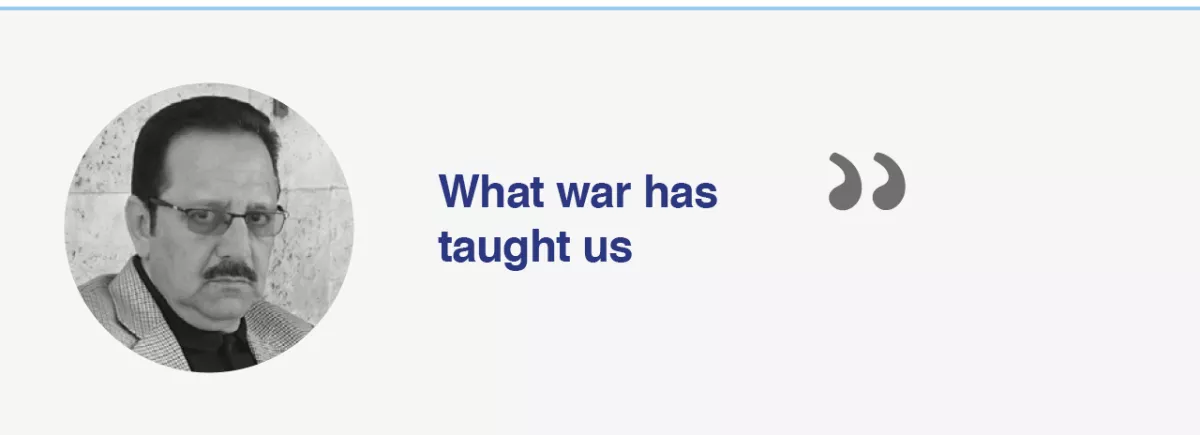
I am a Libyan journalist: Khaled Ali Al Dib
Related project
HiwarThe testimony of Khaled Ali Al Dib, journalist at Radio Libya in Tripoli (Libya).
I am Khaled Ali Al Dib
A few years have passed since our Libyan Spring. They have been painful, agonising years that have scarred our bodies, warped our society and left psychological damage that cosmetic surgeons and the whole of modern medicine won't be able to reverse. Despite everything, however, these years have taught us some lessons and some ideas to bear in mind for the future. These years have taught us a lot; without them, we wouldn't have experienced many things or lived through so many adventures.
These years have taught us that visiting family and friends and social interaction are just traditions that have tied us down for centuries and imprisoned us for years, when a simple phone call or a Facebook message would suffice. To offer our condolences or attend a marriage or a celebration, we no longer need to go anywhere or deal with the hassle and danger of travelling. It's hardly possible, anyway, with the security situation. It would only make the damage even worse.
This war has taught us that the most extreme form of entertainment is to dash to the nearest restaurant, wolf down a meal and bring the family safely home without catching a stray bullet or having your car crushed by a shell.
This war has taught us that a holiday is an overindulgence, a superfluous frill. Finding the means to survive and earning your daily bread are far more important. This war has taught us that your salary belongs to the State, which grants it to you on a whim and takes it away at will. And even if you are granted your salary, it's up to the bank to decide when to pay it out.
This war has taught us that oil is a blessing and a source of wealth, but also an endless curse and infinite ruin. Destroying the oilfields and burning the reserves is a national duty that stirs the people from their lethargy and wakes them up, so that they realise at last that counting on this ephemeral, exhausted wealth is a great mistake and an unpardonable sin. They should turn back the clock and go back to receiving foreign aid and UN handouts, so that they can experience life after oil for real.
This war has taught us that the army is a tool of the dictatorship and the police are an instrument of tyranny. To get rid of them is to win freedom in its truest sense and democracy in its noblest form. Men are born free – they know no limits or bounds.
These years have taught us that central government was a burden on the people and that only one government meant there was only one power. This is what we rebelled against, this is what we broke, this is what we paid such a price to overthrow. The absence, or disappearance, of authority was one of the goals of the people, who protested in the streets shouting "the people will smash the regime".
The years of war have taught us many words and expressions of which we were ignorant, or whose true meaning and effects we did not know. In the media, we would often hear words such as exodus, forced displacement, kidnapping, body search, blockade, civil war and many more besides, yet we attached no importance to them.
This war has taught us that having a nice car or a new vehicle is daring or irresponsible, and that coming home late at night is suicide. Reason dictates that we should buy our transport from the scrapyard, or at most, call a taxi and take cover at home before sundown.
These years have taught us that power cuts are an article of the Constitution, that queues at the bakeries and banks are an everyday phenomenon, and that stockpiling petrol at home is a fundamental act of citizenship. This war has taught us that many of our ideas and beliefs are just emotional hand-me-downs we struggle to discard, such as sovereignty, patriotism, safety, security, freedom of movement, passports and plenty of other old, antiquated notions.
These years have taught us many lessons, but the biggest of all is that suffering is a bar to creativity.
In order to sustain democratic debate in Libya, CFI launched Project Hiwar in early 2017 in partnership with the Crisis and Support Centre of the French Ministry of Europe and Foreign Affairs. The project creates a forum for the expression of different points of view on the Libyan press.
One session made up of four workshops was arranged in Tunisia. It was attended by twelve Libyan journalists, who travelled from Libya, Jordan, Turkey, Egypt and Tunisia.
This article forms part of the booklet I am a Libyan journalist, which collects a variety of pieces written by the journalists involved in Project Hiwar.



